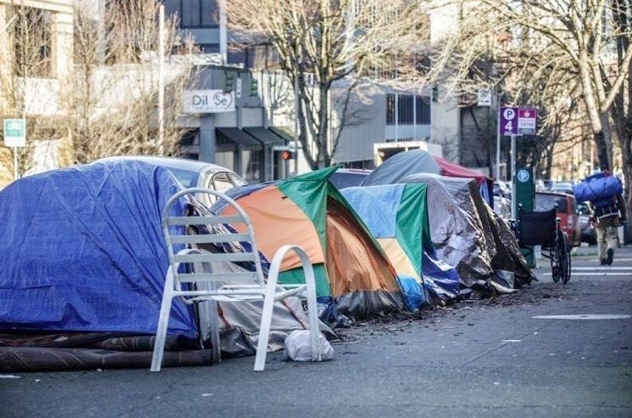Controversy over Multnomah County-funded homeless tents reignites
Published 1:49 pm Wednesday, June 12, 2024

- Homeless tents and tarps crowd sidewalks in downtown Portland.
Multnomah County is continuing to support the distribution of thousands of tents and tarps to the homeless in Portland, costing the city millions of dollars to remove them to comply with a federal court settlement to keep sidewalks clear for the disabled.
Trending
Portland attorney John DiLorenzo made those charges before the City Council on Wednesday, June 12.
DiLorenzo represented a number of disabled Portlanders who won the settlement last May after suing the city in the Oregon U.S. District Court for violating the Americans with Disabilities Act by allowing the tents and tarps on sidewalks.
“There is this incredible dissonance between the city policy and the county policy,” DiLorenzo testified. “The city wants to remove these encampments and funnel people into shelters. The county on the other hand keeps distributing tents — it’s as if you’re trying to clean up a water spill and someone won’t turn off the faucet.”
Trending
While researching the suit, DiLorenzo discovered Multnomah County had bought and distributed at least 33,500 tents and tarps to the homeless that potentially violated the rights of the disabled by blocking sidewalks.
At the time, county officials said they were intended to help people experiencing homelessness live safely outside during the COVID-19 pandemic when shelter capacity was reduced because of social-distancing requirements.
But DiLorenzo presented the council with the results of a public records request that showed the county-run Joint Office of Homeless Services had distributed an additional 6,554 tents and 24,172 tarps in the year since the settlement was approved.
“Since last July, the city has funded over 4,000 encampment removals involving approximately 8,000 to 12,000 tents,” DiLorenzo said. The city has paid Rapid Response, a bio-hazard removal company, to perform these removals as part of a four-year contract costing over $26 million through this year, he added.
“The number of tent removals so far has exceeded the number of houseless persons living on our streets according to the last point in time (homeless) count. So, where are all the new tents coming from?” DiLorenzo asked before presenting an excel spread sheet obtained from the county. It showed that dozens of nonprofit organizations and advocacy groups received the tents and tarps at a county-operated distribution center.
“Certain groups and direct recipients have, in turn, placed these tents and tarps back on our sidewalks and neighborhood streets where the clean-up cycle repeats and millions more dollars are expended,” DiLorenzo said.
In response to a request for comment from the Portland Tribune, Multnomah County Chair Jessica Vega Pederson released a statement defending the tent distribution.
“Our goal is helping people survive until there is enough treatment and shelter available. During emergency weather events especially, this means handing out tents so people sleeping outside with nowhere else to go have some protection from the elements while we work as fast as we can to bring people into shelter and ultimately, into stable housing,” the statement said.
Vega Pederson also suggested the distribution will continue after the July 1 beginning of the next fiscal year because additional funding is included in the new budget the Multnomah County Commission recently approved.
“The expected cost for tents in FY 2025 is $230,000, paying for approximately 6,500 tents — or about 0.05% of the total Joint Office budget. This small investment provides some relief for people sleeping outside until they can be connected to shelter and resources. It is all a part of having a humane response to those living on our streets while we increase our housing and shelter capacity,” the statement continued.
In his testimony to the council, DiLorenzo said the council should seek reimbursement from the county for the cleanup costs of complying with the ADA settlement agreement, and should also end its Intergovernmental Agreement with the county to help fund JOHS.
“And of course, if you truly desire to engage in harm reduction, you should sever your relationship with the Joint Office altogether and use the $42 million of dues you pay each year to provide a more compassionate response—sheltering people as opposed to allowing them to languish on the streets, DiLorenzo said.
Portland Commissioner Rene Gonzalez recently objected to the funds for tents — as well as syringes for a drug safety program — when he learned about it before the budget was approved.
The council is currently considering whether to extend or end its agreement with the county to help fund JOHS. A decision could be made this week







